Latest Sheet Music
Liszt

Franz Liszt (October 22, 1811 – July 31, 1886) was a Hungarian composer, virtuoso pianist and teacher.
Liszt became renowned throughout Europe for his great skill as a performer; to this day, many consider him to have been the greatest pianist in history. He was also an important and influential composer, a notable piano teacher, a conductor who contributed significantly to the modern development of the art, and a benefactor to other composers and performers, notably Richard Wagner and Hector Berlioz.
As a composer, Liszt was one of the most prominent representatives of the "Neudeutsche Schule" ("New German School"). He left behind a huge and diverse oeuvre, in which he influenced his forward-looking contemporaries and anticipated some 20th-century ideas and trends. Some of his most notable contributions were the invention of the symphonic poem, developing the concept of thematic transformation as part of his experiments in musical form and making radical departures in harmony.
Liszt has most frequently been credited to have been the first pianist who gave concerts with programs consisting only of solo pieces. An example is a concert he gave on March 9, 1839, at the Palazzo Poli in Rome. Since Liszt could not find singers who — following the usual habit of the time — should have completed the program, he played four numbers all alone.
Liszt was a prolific composer. Most of his music is for the piano and much of it requires formidable technique.In his most famous and virtuosic works, he is the archetypal Romantic composer. Liszt pioneered the technique of thematic transformation, a method of development which was related to both the existing variation technique and to the new use of the Leitmotif by Richard Wagner. Liszt's piano works are usually divided into two classes. On the one hand, there are "original works", and on the other hand "transcriptions", "paraphrases" or "fantasies" on works by other composers.
Liszt became renowned throughout Europe for his great skill as a performer; to this day, many consider him to have been the greatest pianist in history. He was also an important and influential composer, a notable piano teacher, a conductor who contributed significantly to the modern development of the art, and a benefactor to other composers and performers, notably Richard Wagner and Hector Berlioz.
As a composer, Liszt was one of the most prominent representatives of the "Neudeutsche Schule" ("New German School"). He left behind a huge and diverse oeuvre, in which he influenced his forward-looking contemporaries and anticipated some 20th-century ideas and trends. Some of his most notable contributions were the invention of the symphonic poem, developing the concept of thematic transformation as part of his experiments in musical form and making radical departures in harmony.
Liszt has most frequently been credited to have been the first pianist who gave concerts with programs consisting only of solo pieces. An example is a concert he gave on March 9, 1839, at the Palazzo Poli in Rome. Since Liszt could not find singers who — following the usual habit of the time — should have completed the program, he played four numbers all alone.
Liszt was a prolific composer. Most of his music is for the piano and much of it requires formidable technique.In his most famous and virtuosic works, he is the archetypal Romantic composer. Liszt pioneered the technique of thematic transformation, a method of development which was related to both the existing variation technique and to the new use of the Leitmotif by Richard Wagner. Liszt's piano works are usually divided into two classes. On the one hand, there are "original works", and on the other hand "transcriptions", "paraphrases" or "fantasies" on works by other composers.
Long Shot Party

Long Shot Party (often stylized as LONG SHOT PARTY) was a Japanese six-piece ska band, formed in Sendai, 1998. They released their first mini-album titled Making Ourself Understood in our Sounds in January 2000. And then, in October 2002, their first full album Delta Force released on the Indie Label.On October 2007, they signed with a major label, DefSTAR Records, and released their first major single, "Distance", in January 2008, which was used as the second opening theme for the anime series Naruto Shippuden. Their single "Ano Hi Time Machine" was an opening theme of the anime television series Zoku Natsume Yūjinchō. The band broke up in 2010.
Traditional

Charles Villiers Stanford

Sir Charles Villiers Stanford (30 September 1852 – 29 March 1924) was an Irish-born composer, resident in England for much of his life. He is particularly notable for his choral music. He was professor at the Royal College of Music and University of Cambridge.
Stanford was particularly known in his day for his choral works, chiefly commissioned for performances at the great English provincial festivals. These include two oratorios, a Requiem (1897), a Stabat Mater (1907), and many secular works, often with a nautical theme, including The Revenge (1886), The Voyage of Maeldune (1889), Songs of the Sea (1904), and Songs of the Fleet (1910). His church music still holds a central place among Anglican compositions; particularly popular examples include his Evening Services in B flat, A, G, and C, his Three Latin Motets (Beati quorum via, Justorum animae, and Coelos ascendit hodie), and his anthem For lo, I raise up.
His instrumental works include seven symphonies, six Irish Rhapsodies for orchestra, several works for organ, concertos for violin, cello, clarinet, and piano, and many chamber compositions, including eight string quartets. He also composed songs, part-songs, madrigals, and incidental music to Eumenides and Oedipus Rex (as performed at Cambridge), as well as to Tennyson's Becket. His music shows the influence of Brahms and Schumann, and to a lesser extent of Irish folk music; he was generally unsympathetic to more modern developments. Although his chief importance is often held to be as a teacher of many English composers of the next generation, the last two decades have seen a revival of interest in his larger compositions after a long period of neglect. He published several books, including an informal autobiography, Pages from an Unwritten Diary (1914) and "Musical Composition" (1911), which includes an interesting passage on pure intonation.
Stanford was particularly known in his day for his choral works, chiefly commissioned for performances at the great English provincial festivals. These include two oratorios, a Requiem (1897), a Stabat Mater (1907), and many secular works, often with a nautical theme, including The Revenge (1886), The Voyage of Maeldune (1889), Songs of the Sea (1904), and Songs of the Fleet (1910). His church music still holds a central place among Anglican compositions; particularly popular examples include his Evening Services in B flat, A, G, and C, his Three Latin Motets (Beati quorum via, Justorum animae, and Coelos ascendit hodie), and his anthem For lo, I raise up.
His instrumental works include seven symphonies, six Irish Rhapsodies for orchestra, several works for organ, concertos for violin, cello, clarinet, and piano, and many chamber compositions, including eight string quartets. He also composed songs, part-songs, madrigals, and incidental music to Eumenides and Oedipus Rex (as performed at Cambridge), as well as to Tennyson's Becket. His music shows the influence of Brahms and Schumann, and to a lesser extent of Irish folk music; he was generally unsympathetic to more modern developments. Although his chief importance is often held to be as a teacher of many English composers of the next generation, the last two decades have seen a revival of interest in his larger compositions after a long period of neglect. He published several books, including an informal autobiography, Pages from an Unwritten Diary (1914) and "Musical Composition" (1911), which includes an interesting passage on pure intonation.
The Little Mermaid
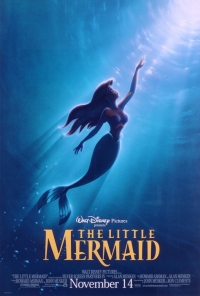
The Little Mermaid is a 1989 animated feature produced by Walt Disney Feature Animation with pencil test began on September 23, 1988 and first released on November 17, 1989 by Walt Disney Pictures with the first Wallace and Gromit short film, A Grand Day Out. The twenty-eighth animated feature in the Disney animated features canon, the film is based on the Hans Christian Andersen fairy tale "The Little Mermaid." During its initial release, it grossed over $84 million in the United States and an additional $99 million internationally.
The film is given credit for breathing life back into the animated feature film genre after a string of critical and commercial failures that had dated to the early 1980s. It also marked the start of the era known as Disney Renaissance.
A stage adaptation of the film with a book by Doug Wright and additional songs by Alan Menken and new lyricist Glenn Slater opened in Denver in July 2007 and began performances on Broadway.
The Little Mermaid: An Original Walt Disney Records Soundtrack is the soundtrack to Disney's 1989 animated feature The Little Mermaid. It contains the songs from the film written by Alan Menken and Howard Ashman, as well as the film's score composed by Alan Menken. The album received the Academy Award for Best Original Score and the Golden Globe Award for Best Original Score.
In October 2006, a new two-disc special edition version of the soundtrack was released to correspond with the two-disc Platinum Edition DVD release of The Little Mermaid. The first disc remains identical to the original release, yet with remastered audio, while the newly added second disc is composed of various newly recorded version of the film's songs by different artists, such as Ashley Tisdale, Raven-Symoné, The Jonas Brothers, and Jessica Simpson. It also includeds two videos, as well as new cover art.
The film is given credit for breathing life back into the animated feature film genre after a string of critical and commercial failures that had dated to the early 1980s. It also marked the start of the era known as Disney Renaissance.
A stage adaptation of the film with a book by Doug Wright and additional songs by Alan Menken and new lyricist Glenn Slater opened in Denver in July 2007 and began performances on Broadway.
The Little Mermaid: An Original Walt Disney Records Soundtrack is the soundtrack to Disney's 1989 animated feature The Little Mermaid. It contains the songs from the film written by Alan Menken and Howard Ashman, as well as the film's score composed by Alan Menken. The album received the Academy Award for Best Original Score and the Golden Globe Award for Best Original Score.
In October 2006, a new two-disc special edition version of the soundtrack was released to correspond with the two-disc Platinum Edition DVD release of The Little Mermaid. The first disc remains identical to the original release, yet with remastered audio, while the newly added second disc is composed of various newly recorded version of the film's songs by different artists, such as Ashley Tisdale, Raven-Symoné, The Jonas Brothers, and Jessica Simpson. It also includeds two videos, as well as new cover art.
Franz Schubert

Franz Peter Schubert (German pronunciation: ; January 31, 1797 – November 19, 1828) was an Austrian composer. He wrote some 600 Lieder, nine symphonies (including the famous "Unfinished Symphony"), liturgical music, operas, some incidental music, and a large body of chamber and solo piano music. He is particularly noted for his original melodic and harmonic writing.
Schubert was born into a musical family, and received formal musical training through much of his childhood. While Schubert had a close circle of friends and associates who admired his work (amongst them the prominent singer Johann Michael Vogl), wide appreciation of his music during his lifetime was limited at best. He was never able to secure adequate permanent employment, and for most of his career he relied on the support of friends and family. He made some money from published works, and occasionally gave private musical instruction. In the last year of his life he began to receive wider acclaim. He died at the age of 31 of "typhoid fever", a diagnosis which was vague at the time; several scholars suspect the real illness was tertiary syphilis.
Interest in Schubert's work increased dramatically in the decades following his death. Composers like Franz Liszt, Robert Schumann and Felix Mendelssohn discovered, collected, and championed his works in the 19th century, as did musicologist Sir George Grove. Franz Schubert is now widely considered to be one of the greatest composers in the Western tradition.
Schubert was born into a musical family, and received formal musical training through much of his childhood. While Schubert had a close circle of friends and associates who admired his work (amongst them the prominent singer Johann Michael Vogl), wide appreciation of his music during his lifetime was limited at best. He was never able to secure adequate permanent employment, and for most of his career he relied on the support of friends and family. He made some money from published works, and occasionally gave private musical instruction. In the last year of his life he began to receive wider acclaim. He died at the age of 31 of "typhoid fever", a diagnosis which was vague at the time; several scholars suspect the real illness was tertiary syphilis.
Interest in Schubert's work increased dramatically in the decades following his death. Composers like Franz Liszt, Robert Schumann and Felix Mendelssohn discovered, collected, and championed his works in the 19th century, as did musicologist Sir George Grove. Franz Schubert is now widely considered to be one of the greatest composers in the Western tradition.
Little Women

Little Women is a musical with a book by Allan Knee, lyrics by Mindi Dickstein, and music by Jason Howland.
Based on Louisa May Alcott's classic 1869 semi-autobiographical novel, it focuses on the four March sisters - feisty, tomboyish, aspiring author Jo, romantic Meg, pretentious Amy, and kind-hearted Beth - and their beloved Marmee, at home in Concord, Massachusetts while the family patriarch is away serving as a Union Army chaplain during the Civil War. Intercut with the vignettes in which their lives unfold are several recreations of the melodramatic short stories Jo writes in her attic studio.
After 55 previews, the Broadway production, directed by Susan H. Schulman, opened on January 23, 2005 at the Virginia Theatre where, hampered by reviews ranging from lukewarm to abrasive, it closed after 137 performances.
The cast included Sutton Foster, Maureen McGovern, Janet Carroll, Jenny Powers, Megan McGinnis, Amy McAlexander, Danny Gurwin, Autumn Hurlburt and John Hickok.
Based on Louisa May Alcott's classic 1869 semi-autobiographical novel, it focuses on the four March sisters - feisty, tomboyish, aspiring author Jo, romantic Meg, pretentious Amy, and kind-hearted Beth - and their beloved Marmee, at home in Concord, Massachusetts while the family patriarch is away serving as a Union Army chaplain during the Civil War. Intercut with the vignettes in which their lives unfold are several recreations of the melodramatic short stories Jo writes in her attic studio.
After 55 previews, the Broadway production, directed by Susan H. Schulman, opened on January 23, 2005 at the Virginia Theatre where, hampered by reviews ranging from lukewarm to abrasive, it closed after 137 performances.
The cast included Sutton Foster, Maureen McGovern, Janet Carroll, Jenny Powers, Megan McGinnis, Amy McAlexander, Danny Gurwin, Autumn Hurlburt and John Hickok.
Vangelis
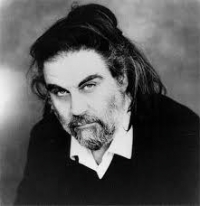
Evangelos Odysseas Papathanassiou (Greek: Ευάγγελος Οδυσσέας Παπαθανασίου ; born 29 March 1943), known professionally as Vangelis (Greek: Βαγγέλης ; English pronunciation: /væŋˈɡɛlᵻs/), is a Greek composer of electronic, progressive, ambient, jazz, pop rock, and orchestral music. He is best known for his Academy Award–winning score for the film Chariots of Fire, composing scores for the films Antarctica, Blade Runner, Missing, 1492: Conquest of Paradise, and Alexander, and the use of his music in the PBS documentary Cosmos: A Personal Voyage by Carl Sagan.
After having taking piano lessons from renowned Greek composer Aristotelis Koundouroff, Vangelis began his professional musical career working with several popular bands of the 1960s such as The Forminx and Aphrodite's Child, with the latter's album 666 going on to be recognized as a psychedelic classic. Throughout the 1970s, Vangelis composed music scores for several animal documentaries, including L'Apocalypse Des Animaux, La Fête sauvage and Opéra sauvage; the success of these scores brought him into the film scoring mainstream. In the early 1980s, Vangelis formed a musical partnership with Jon Anderson, the lead singer of progressive rock band Yes, and the duo went on to release several albums together as Jon & Vangelis.
In 1981, he composed the score for the Oscar-winning film Chariots of Fire, for which he won an Academy Award for Best Original Music Score. The soundtrack's single, the film's "Titles" theme, also reached the top of the American Billboard Hot 100 chart and was used as the background music at the London 2012 Olympics winners' medal presentation ceremonies.
Having had a career in music spanning over 50 years and having composed and performed more than 52 albums, Vangelis is one of the most important proponents of electronic music.
After having taking piano lessons from renowned Greek composer Aristotelis Koundouroff, Vangelis began his professional musical career working with several popular bands of the 1960s such as The Forminx and Aphrodite's Child, with the latter's album 666 going on to be recognized as a psychedelic classic. Throughout the 1970s, Vangelis composed music scores for several animal documentaries, including L'Apocalypse Des Animaux, La Fête sauvage and Opéra sauvage; the success of these scores brought him into the film scoring mainstream. In the early 1980s, Vangelis formed a musical partnership with Jon Anderson, the lead singer of progressive rock band Yes, and the duo went on to release several albums together as Jon & Vangelis.
In 1981, he composed the score for the Oscar-winning film Chariots of Fire, for which he won an Academy Award for Best Original Music Score. The soundtrack's single, the film's "Titles" theme, also reached the top of the American Billboard Hot 100 chart and was used as the background music at the London 2012 Olympics winners' medal presentation ceremonies.
Having had a career in music spanning over 50 years and having composed and performed more than 52 albums, Vangelis is one of the most important proponents of electronic music.
BoA

Boa Kwon (born November 5, 1986 in Gyeonggi-do, South Korea), commonly known by her stage name BoA, is a multilingual Korean singer. She has been active in both South Korea and Japan. Aside from her native Korean, BoA also speaks Japanese and conversational English She has also released a number of Chinese songs, although she is not able to speak the language itself.
BoA has achieved great commercial success, particularly in South Korea and Japan where she has claimed four number one studio albums in Korea and six in Japan. The release of The Face made BoA only one of two artists in J-pop history to top the Oricon Weekly Album Charts six consecutive times, with the other being Ayumi Hamasaki who currently has eight consecutive number one albums.
BoA has achieved great commercial success, particularly in South Korea and Japan where she has claimed four number one studio albums in Korea and six in Japan. The release of The Face made BoA only one of two artists in J-pop history to top the Oricon Weekly Album Charts six consecutive times, with the other being Ayumi Hamasaki who currently has eight consecutive number one albums.
Joao Donato

João Donato de Oliveira Neto is a Brazilian jazz and bossa nova pianist from Brazil. He first worked with Altamiro Carrilho and went on to perform with Antonio Carlos Jobim and Astrud Gilberto.A professional at the age of 15, Donato played accordion at the Sinatra-Farney Fan Club.He recorded for the first time with Altamiro Carrilho. Soon after he joined a band led by violinist Fafá Lemos that played in Brazilian nightclubs. His first solo album came out in 1953. He led the bossa nova band Os Namorados which performed songs such as "Tenderly".
Noël Regney

Noël Regney, was a French World War II veteran and songwriter who is best known for composing the Christmas standard "Do You Hear What I Hear?" with his then-wife Gloria Shayne Baker in 1962. Originally from Alsace, France, he moved to New York City and then eventually Connecticut.
Die Schönsten Kinderlieder

The most beautiful children's songs.
Requiem for a Dream
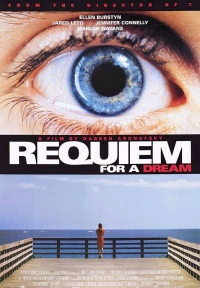
Requiem for a Dream is an Academy Award-nominated 2000 film adaptation of the 1978 novel of the same name. The novel was written by Hubert Selby, Jr.; the film adaptation was directed by Darren Aronofsky, and starred Ellen Burstyn, Jared Leto, Jennifer Connelly, Matt Taylor and Marlon Wayans. Burstyn was nominated for an Academy Award for Best Actress for her performance.
Eric Clapton
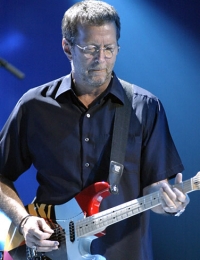
Eric Patrick Clapton, CBE (born 30 March 1945), is an English blues-rock guitarist, singer, songwriter and composer. He is one of the most successful musicians of the 20th and 21st centuries, garnering an unprecedented three inductions into the Rock and Roll Hall of Fame (The Yardbirds, Cream, and solo). Often viewed by critics and fans alike as one of the greatest guitarists of all time, Clapton was ranked fourth in Rolling Stone Magazine's list of the "100 Greatest Guitarists of All Time" and #53 on their list of the Immortals: 100 Greatest Artists of All Time.
Although Clapton's musical style has varied throughout his career, it has usually remained rooted in the blues. Clapton is credited as an innovator in several phases of his career, which have included blues-rock (with John Mayall & the Bluesbreakers and The Yardbirds) and psychedelic rock (with Cream). Clapton has also achieved great chart success in genres ranging from Delta blues (Me and Mr. Johnson) to pop ("Change the World") and reggae (Bob Marley's "I Shot the Sheriff"). Clapton also achieved fame with Derek and the Dominos through the hit song "Layla".
Although Clapton's musical style has varied throughout his career, it has usually remained rooted in the blues. Clapton is credited as an innovator in several phases of his career, which have included blues-rock (with John Mayall & the Bluesbreakers and The Yardbirds) and psychedelic rock (with Cream). Clapton has also achieved great chart success in genres ranging from Delta blues (Me and Mr. Johnson) to pop ("Change the World") and reggae (Bob Marley's "I Shot the Sheriff"). Clapton also achieved fame with Derek and the Dominos through the hit song "Layla".
Steve Howe
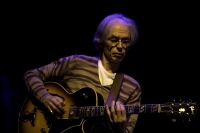
Stephen James Howe (born 8 April 1947) is an English musician, songwriter and producer, best known as the guitarist in the progressive rock band Yes across three stints since 1970. Born in Holloway, North London, Howe developed an interest in the guitar and began to learn the instrument himself at age 12. He embarked on a music career in 1964, first playing in several London-based blues, covers, and psychedelic rock bands for six years, including the Syndicats, Tomorrow, and Bodast.
Lars Winnerbäck

Lars Mattias Winnerbäck (born 19 October 1975 in Stockholm) is a Swedish singer and songwriter. He was born in Stockholm but spent his childhood in Vidingsjö, Linköping, where he attended Katedralskolan. He moved back to Stockholm in 1996, the same year he released his first album, Dans med svåra steg. He is now one of Sweden's most popular artists.The influence of songwriters like Carl Michael Bellman, Evert Taube, Bob Dylan, Ulf Lundell and Cornelis Vreeswijk shines through in Winnerbäck's exclusively Swedish lyrics, which deal with shallowness, prejudice in society, as well as romance, relationships and anxiety. Several songs depict the difference between living in small town Linköping and the capital Stockholm.
Luigi Torchi

Luigi Torchi was an Italian musicologist. Torchi was born in Mordano. He studied composition at the Accademia Filarmonica di Bologna, at the Music conservatories of Naples with Paolo Serrao and later in France and Germany, where he benefited from the teaching of Salomon Jadassohn and Carl Reinecke in Leipzig.
Mozart

Wolfgang Amadeus Mozart, full name Johann Chrysostom Wolfgang Amadeus Mozart (27 January 1756 â 5 December 1791) was a prolific and influential composer of the Classical era. His over 600 compositions include works widely acknowledged as pinnacles of symphonic, concertante, chamber, piano, operatic, and choral music. Mozart is among the most enduringly popular of classical composers, and many of his works are part of the standard concert repertoire.
Mozart's music, like Haydn's, stands as an archetypal example of the Classical style. His works spanned the period during which that style transformed from one exemplified by the style galant to one that began to incorporate some of the contrapuntal complexities of the late Baroque, complexities against which the galant style had been a reaction. Mozart's own stylistic development closely paralleled the development of the classical style as a whole. In addition, he was a versatile composer and wrote in almost every major genre, including symphony, opera, the solo concerto, chamber music including string quartet and string quintet, and the piano sonata. While none of these genres were new, the piano concerto was almost single-handedly developed and popularized by Mozart. He also wrote a great deal of religious music, including masses; and he composed many dances, divertimenti, serenades, and other forms of light entertainment.
The central traits of the classical style can be identified in Mozart's music. Clarity, balance, and transparency are hallmarks of his work.
Mozart's music, like Haydn's, stands as an archetypal example of the Classical style. His works spanned the period during which that style transformed from one exemplified by the style galant to one that began to incorporate some of the contrapuntal complexities of the late Baroque, complexities against which the galant style had been a reaction. Mozart's own stylistic development closely paralleled the development of the classical style as a whole. In addition, he was a versatile composer and wrote in almost every major genre, including symphony, opera, the solo concerto, chamber music including string quartet and string quintet, and the piano sonata. While none of these genres were new, the piano concerto was almost single-handedly developed and popularized by Mozart. He also wrote a great deal of religious music, including masses; and he composed many dances, divertimenti, serenades, and other forms of light entertainment.
The central traits of the classical style can be identified in Mozart's music. Clarity, balance, and transparency are hallmarks of his work.
Alice DeeJay
Alice Deejay is a Dutch Eurodance-pop project founded and produced by Wessel van Diepen, Dennis van den Driesschen, Sebastiaan Molijn and Eelke Kalberg, fronted by singer Judith Anna Pronk.
Paganini

Niccolò Paganini (27 October 1782 – 27 May 1840) was an Italian violinist, violist, guitarist, and composer. He was one of the most celebrated violin virtuosi of his time, and left his mark as one of the pillars of modern violin technique. His caprice in A minor, Op. 1 No. 24 is among his best known of compositions, and serves as inspiration for many prominent artists.
Paganini composed his own works to play exclusively in his concerts, all of which had profound influences on the evolution of violin techniques. His 24 Caprices were probably composed in the period between 1805 to 1809, while he was in the service of the Baciocchi court. Also during this period, he composed the majority of the solo pieces, duo-sonatas,trios and quartets for the guitar. These chamber works may have been inspired by the publication, in Lucca, of the guitar quintets of Boccherini. Many of his variations (and he has become the de facto master of this musical genre), including Le Streghe, The Carnival of Venice, and Nel cor più non mi sento, were composed, or at least first performed, before his European concert tour.
Playbill of Paganini's concert at the Covent Garden in 1832. Note that all solo pieces were of his composition, which was typical of all his concerts.
Generally speaking, Paganini's compositions were technically imaginative, and the timbre of the instrument was greatly expanded as a result of these works. Sounds of different musical instruments and animals were often imitated. One such composition was titled Il Fandango Spanolo (The Spanish Dance), which featured a series of humorous imitations of farm animals. Even more outrageous was a solo piece Duetto Amoroso, in which the sighs and groans of lovers were intimately depicted on the violin. Fortunately there survives a manuscript of the Duetto which has been recorded, while the existence of the Fandango is known only through concert posters.
However, his works were criticized for lacking characteristics of true polyphonism, as pointed out by Eugène Ysaÿe. Yehudi Menuhin, on the other hand, suggested that this might have been the result of his reliance on the guitar (in lieu of the piano) as an aid in composition. The orchestral parts for his concertos were often polite, unadventurous, and clearly supportive of the soloist. In this, his style is consistent with that of other Italian composers such as Paisiello, Rossini and Donizetti, who were influenced by the guitar-song milieu of Naples during this period.
Paganini was also the inspiration of many prominent composers. Both "La Campanella" and the A minor caprice (Nr. 24) have been an object of interest for a number of composers. Franz Liszt, Johannes Brahms, Sergei Rachmaninoff, Boris Blacher, Andrew Lloyd Webber, George Rochberg and Witold Lutosławski, among others, wrote well-known variations on these themes.
Paganini composed his own works to play exclusively in his concerts, all of which had profound influences on the evolution of violin techniques. His 24 Caprices were probably composed in the period between 1805 to 1809, while he was in the service of the Baciocchi court. Also during this period, he composed the majority of the solo pieces, duo-sonatas,trios and quartets for the guitar. These chamber works may have been inspired by the publication, in Lucca, of the guitar quintets of Boccherini. Many of his variations (and he has become the de facto master of this musical genre), including Le Streghe, The Carnival of Venice, and Nel cor più non mi sento, were composed, or at least first performed, before his European concert tour.
Playbill of Paganini's concert at the Covent Garden in 1832. Note that all solo pieces were of his composition, which was typical of all his concerts.
Generally speaking, Paganini's compositions were technically imaginative, and the timbre of the instrument was greatly expanded as a result of these works. Sounds of different musical instruments and animals were often imitated. One such composition was titled Il Fandango Spanolo (The Spanish Dance), which featured a series of humorous imitations of farm animals. Even more outrageous was a solo piece Duetto Amoroso, in which the sighs and groans of lovers were intimately depicted on the violin. Fortunately there survives a manuscript of the Duetto which has been recorded, while the existence of the Fandango is known only through concert posters.
However, his works were criticized for lacking characteristics of true polyphonism, as pointed out by Eugène Ysaÿe. Yehudi Menuhin, on the other hand, suggested that this might have been the result of his reliance on the guitar (in lieu of the piano) as an aid in composition. The orchestral parts for his concertos were often polite, unadventurous, and clearly supportive of the soloist. In this, his style is consistent with that of other Italian composers such as Paisiello, Rossini and Donizetti, who were influenced by the guitar-song milieu of Naples during this period.
Paganini was also the inspiration of many prominent composers. Both "La Campanella" and the A minor caprice (Nr. 24) have been an object of interest for a number of composers. Franz Liszt, Johannes Brahms, Sergei Rachmaninoff, Boris Blacher, Andrew Lloyd Webber, George Rochberg and Witold Lutosławski, among others, wrote well-known variations on these themes.
Pachelbel

Johann Pachelbel (baptized September 1, 1653 – buried March 9, 1706) was a German Baroque composer, organist and teacher who brought the south German organ tradition to its peak. He composed a large body of sacred and secular music, and his contributions to the development of the chorale prelude and fugue have earned him a place among the most important composers of the middle Baroque era.
Pachelbel's work enjoyed enormous popularity during his lifetime; he had many pupils and his music became a model for the composers of south and central Germany. Today, Pachelbel is best known for the Canon in D, the only canon he wrote. In addition to the canon, his most well-known works include the Chaconne in F minor, the Toccata in E minor for organ, and the Hexachordum Apollinis, a set of keyboard variations.
Pachelbel's music was influenced by southern German composers, such as Johann Jakob Froberger and Johann Kaspar Kerll, Italians such as Girolamo Frescobaldi and Alessandro Poglietti, French composers, and the composers of the Nuremberg tradition. Pachelbel preferred a lucid, uncomplicated contrapuntal style that emphasized melodic and harmonic clarity. His music is less virtuosic and less adventurous harmonically than that of Dieterich Buxtehude, although, like Buxtehude, Pachelbel experimented with different ensembles and instrumental combinations in his chamber music and, most importantly, his vocal music, much of which features exceptionally rich instrumentation. Pachelbel explored many variation forms and associated techniques, which manifest themselves in various diverse pieces, from sacred concertos to harpsichord suites.
Pachelbel's work enjoyed enormous popularity during his lifetime; he had many pupils and his music became a model for the composers of south and central Germany. Today, Pachelbel is best known for the Canon in D, the only canon he wrote. In addition to the canon, his most well-known works include the Chaconne in F minor, the Toccata in E minor for organ, and the Hexachordum Apollinis, a set of keyboard variations.
Pachelbel's music was influenced by southern German composers, such as Johann Jakob Froberger and Johann Kaspar Kerll, Italians such as Girolamo Frescobaldi and Alessandro Poglietti, French composers, and the composers of the Nuremberg tradition. Pachelbel preferred a lucid, uncomplicated contrapuntal style that emphasized melodic and harmonic clarity. His music is less virtuosic and less adventurous harmonically than that of Dieterich Buxtehude, although, like Buxtehude, Pachelbel experimented with different ensembles and instrumental combinations in his chamber music and, most importantly, his vocal music, much of which features exceptionally rich instrumentation. Pachelbel explored many variation forms and associated techniques, which manifest themselves in various diverse pieces, from sacred concertos to harpsichord suites.
Pink

Alecia Beth Moore (born on September 8, 1979), known professionally as Pink (often stylized as P!nk), is a two-time Grammy-winning American singer-songwriter who gained prominence in 2000.
Pink released her first record, the R&B-oriented Can't Take Me Home, in 2000 via LaFace Records. Her pop rock-based second studio album, M!ssundaztood, was released in 2001 and is her biggest seller to date. Her third album, 2003's Try This, failed to match the success of M!ssundaztood. After taking a break, Pink released her fourth studio album, I'm Not Dead (2006), which was successful worldwide. Pink has so far sold over 25 million albums worldwide. Her upcoming album, Funhouse, will be released in October 2008.
Pink released her first record, the R&B-oriented Can't Take Me Home, in 2000 via LaFace Records. Her pop rock-based second studio album, M!ssundaztood, was released in 2001 and is her biggest seller to date. Her third album, 2003's Try This, failed to match the success of M!ssundaztood. After taking a break, Pink released her fourth studio album, I'm Not Dead (2006), which was successful worldwide. Pink has so far sold over 25 million albums worldwide. Her upcoming album, Funhouse, will be released in October 2008.
Neon Genesis Evangelion
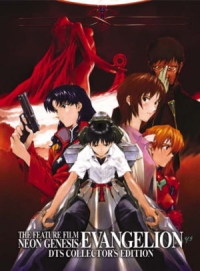
Neon Genesis Evangelion commonly referred to as NGE, Eva, or Evangelion, is a commercially and critically successful, influential, and popular Japanese anime that began in October 1995; the series launched the Neon Genesis Evangelion franchise. It is commonly regarded as one of the greatest anime of all time. The anime was created by Gainax, written and directed by Hideaki Anno, and co-produced by TV Tokyo and Nihon Ad Systems (NAS).
Evangelion is an apocalyptic mecha action series which centers around the efforts by the paramilitary organization Nerv to fight monstrous beings called Angels, primarily using giant mecha called Evangelions which are piloted by select teenagers, one of whom is the primary protagonist. It follows those teenagers and other NERV members until the defeat of the Angels and the eventual apocalyptic ending.
Events in the series refer to Judeo-Christian symbols from the book of Genesis and Biblical apocrypha among others. Later episodes shift focus to psychoanalysis of the main characters, who display various emotional problems and mental illnesses; the nature of existence and reality are questioned in a way that lets Evangelion be characterized as "postmodern fantasy". Hideaki Anno, the director of the anime series, had suffered from clinical depression prior to creating the series, and the psychological aspects of the show are based on the director's own experiences with overcoming this illness.
Evangelion is an apocalyptic mecha action series which centers around the efforts by the paramilitary organization Nerv to fight monstrous beings called Angels, primarily using giant mecha called Evangelions which are piloted by select teenagers, one of whom is the primary protagonist. It follows those teenagers and other NERV members until the defeat of the Angels and the eventual apocalyptic ending.
Events in the series refer to Judeo-Christian symbols from the book of Genesis and Biblical apocrypha among others. Later episodes shift focus to psychoanalysis of the main characters, who display various emotional problems and mental illnesses; the nature of existence and reality are questioned in a way that lets Evangelion be characterized as "postmodern fantasy". Hideaki Anno, the director of the anime series, had suffered from clinical depression prior to creating the series, and the psychological aspects of the show are based on the director's own experiences with overcoming this illness.
Thomas Morley

Thomas Morley British composer, organist and theorist. Morley is the most famous non-religious composer of the Elizabethan period and a leading representative of the English madrigal school. He began singing in local cathedrals and in 1583 became the choir conductor.
Larry Carlton

Larry Eugene Carlton (born March 2, 1948) is an American guitarist who built his career as a studio musician in the 1970s and '80s for acts such as Steely Dan and Joni Mitchell. He has participated in thousands of recording sessions, recorded on hundreds of albums in many genres, for television and movies, and on more than 100 gold records. He has been a member of the jazz fusion group the Crusaders, the smooth jazz band Fourplay, and has maintained a long solo career.
Jay Chou
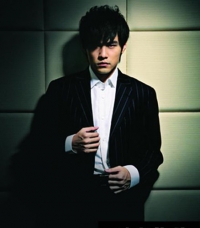
Jay Chou (traditional Chinese: 周杰倫; simplified Chinese: 周杰伦; pinyin: Zhōu Jiélún; Wade-Giles: Chou Chieh-lun; Pe̍h-ōe-jī: Chiu Kia̍t-lûn) (born January 18, 1979) is a Taiwanese musician, singer, producer, actor and director who has won the World Music Award four times. He is well-known for composing all his own songs and songs for other singers. In 1998 he was discovered in a talent contest where he displayed his piano and song-writing skills. Over the next two years, he was hired to compose for popular Chinese singers. Although he was trained in classical music, Chou combines Chinese and Western music styles to produce songs that fuse R&B, rock and pop genres, covering issues such as domestic violence, war, and urbanization.
In 2000 Chou released his first album, titled Jay, under the record company Alfa Music. Since then he has released one album per year, selling several million copies each. His music has gained recognition throughout Asia, most notably in regions such as Taiwan, China, Hong Kong, Japan, Malaysia, Indonesia, Singapore, Thailand, Vietnam and in overseas Asian communities, winning more than 20 awards each year. He has sold over 25 million albums worldwide. He debuted his acting career in Initial D (2005), for which he won Best Newcomer Actor in Golden Horse Awards, and was nominated for Best Supporting Actor by Hong Kong Film Awards for his role in Curse of the Golden Flower (2006). His career now extends into directing and running his own record company JVR Music. He has also endorsed various models of Media Players released by Onda in which he appears on the box, and his signature and likeness is printed on the back of certain models of these players.
In 2000 Chou released his first album, titled Jay, under the record company Alfa Music. Since then he has released one album per year, selling several million copies each. His music has gained recognition throughout Asia, most notably in regions such as Taiwan, China, Hong Kong, Japan, Malaysia, Indonesia, Singapore, Thailand, Vietnam and in overseas Asian communities, winning more than 20 awards each year. He has sold over 25 million albums worldwide. He debuted his acting career in Initial D (2005), for which he won Best Newcomer Actor in Golden Horse Awards, and was nominated for Best Supporting Actor by Hong Kong Film Awards for his role in Curse of the Golden Flower (2006). His career now extends into directing and running his own record company JVR Music. He has also endorsed various models of Media Players released by Onda in which he appears on the box, and his signature and likeness is printed on the back of certain models of these players.
Music theory

Music theory is the study of the practices and possibilities of music. The Oxford Companion to Music describes three interrelated uses of the term "music theory"
Lineu Soares
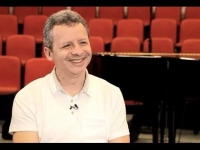
Lineu Soares in Piano from the São Judas Tadeu University (1988) and master in Music from the State University of Campinas (2012). He is currently a University Professor at the Adventist University Center of São Paulo.
Michel Camilo
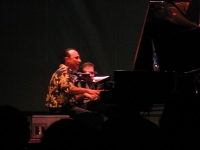
Michel Camilo (born April 4, 1954) is a pianist and composer from Santo Domingo, Dominican Republic. He is known as a great jazz, Latin and classical pianist with superb technical ability, and has played and recorded with many world-famous musicians. Michel lists some of his main influences as Chick Corea, Keith Jarrett, Oscar Peterson, Bill Evans, and Art Tatum.
Nobuo Uematsu

Nobuo Uematsu (植松伸夫 Uematsu Nobuo?, born March 21, 1959) is a Japanese video game composer and musician, best known for scoring the majority of titles in the Final Fantasy series. He is regarded as one of the most famous and respected composers in the video game community. Uematsu is a self-taught musician; he began to play the piano at the age of eleven or twelve, with Elton John as his biggest influence.
Uematsu joined Square (later Square Enix) in 1985, where he met Final Fantasy creator Hironobu Sakaguchi. They have worked together on numerous titles, most notably the games in the Final Fantasy series. After nearly 20 years in the company, he left Square Enix in 2004 and founded his own company called Smile Please, as well as the music production company Dog Ear Records. He has since composed music as a freelancer for video games primarily developed by Square Enix and Sakaguchi's development studio Mistwalker.
A handful of soundtracks and arranged albums of Uematsu's game scores have been released. Pieces from his video game works have been performed in concerts worldwide, and numerous Final Fantasy concerts have also been held. He has worked with Grammy Award-winning conductor Arnie Roth on several of these concerts. In 2002, he formed a rock band with colleagues Kenichiro Fukui and Tsuyoshi Sekito called The Black Mages, in which Uematsu plays the keyboard. The band plays arranged rock versions of Uematsu's Final Fantasy compositions.
Uematsu joined Square (later Square Enix) in 1985, where he met Final Fantasy creator Hironobu Sakaguchi. They have worked together on numerous titles, most notably the games in the Final Fantasy series. After nearly 20 years in the company, he left Square Enix in 2004 and founded his own company called Smile Please, as well as the music production company Dog Ear Records. He has since composed music as a freelancer for video games primarily developed by Square Enix and Sakaguchi's development studio Mistwalker.
A handful of soundtracks and arranged albums of Uematsu's game scores have been released. Pieces from his video game works have been performed in concerts worldwide, and numerous Final Fantasy concerts have also been held. He has worked with Grammy Award-winning conductor Arnie Roth on several of these concerts. In 2002, he formed a rock band with colleagues Kenichiro Fukui and Tsuyoshi Sekito called The Black Mages, in which Uematsu plays the keyboard. The band plays arranged rock versions of Uematsu's Final Fantasy compositions.
Keith Jarrett

Keith Jarrett (born May 8, 1945 in Allentown, Pennsylvania) is an American pianist and composer.
His career started with Art Blakey, Charles Lloyd and Miles Davis. Since the early 1970s he has enjoyed a great deal of success in both classical music and jazz, as a group leader and a solo performer. His improvisation technique combines not only jazz, but also other forms of music, especially classical, gospel, blues and ethnic folk music.
In 2003 he received the Polar Music Prize, being the first (and to this day only) recipient not sharing the prize with anyone else.
His career started with Art Blakey, Charles Lloyd and Miles Davis. Since the early 1970s he has enjoyed a great deal of success in both classical music and jazz, as a group leader and a solo performer. His improvisation technique combines not only jazz, but also other forms of music, especially classical, gospel, blues and ethnic folk music.
In 2003 he received the Polar Music Prize, being the first (and to this day only) recipient not sharing the prize with anyone else.
Duke Ellington

Edward Kennedy "Duke" Ellington (April 29, 1899 â May 24, 1974) was an American composer, pianist, and bandleader.
Recognized during his life as one of the most influential figures in jazz, if not in all American music, Ellington's reputation has increased since his death, including a special award citation from the Pulitzer Prize Board.
Ellington called his style and sound "American Music" rather than jazz, and liked to describe those who impressed him as "beyond category", including many of the musicians who served with his orchestra, some of whom were themselves considered among the giants of jazz and remained with Ellington's orchestra for decades. While many were noteworthy in their own right, it was Ellington that melded them into one of the most well-known orchestral units in the history of jazz. He often composed specifically for the style and skills of these individuals, such as "Jeep's Blues" for Johnny Hodges, "Concerto for Cootie" ("Do Nothing Till You Hear from Me") for Cootie Williams and "The Mooche" for Tricky Sam Nanton. He also recorded songs written by his bandsmen, such as Juan Tizol's "Caravan" and "Perdido" which brought the "Spanish Tinge" to big-band jazz. After 1941, he frequently collaborated with composer-arranger Billy Strayhorn, who he called his alter-ego.
One of the twentieth century's best-known African-American celebrities, Ellington recorded for many American record companies, and appeared in several films. Ellington and his orchestra toured the United States and Europe regularly before and after World War II. Ellington led his band from 1923 until his death in 1974. His son Mercer Ellington took over the band until his death from cancer in 1996. Paul Ellington, Mercer's youngest son, took over the Orchestra from there and after his mother's passing took over the Estate of Duke and Mercer Ellington.
Recognized during his life as one of the most influential figures in jazz, if not in all American music, Ellington's reputation has increased since his death, including a special award citation from the Pulitzer Prize Board.
Ellington called his style and sound "American Music" rather than jazz, and liked to describe those who impressed him as "beyond category", including many of the musicians who served with his orchestra, some of whom were themselves considered among the giants of jazz and remained with Ellington's orchestra for decades. While many were noteworthy in their own right, it was Ellington that melded them into one of the most well-known orchestral units in the history of jazz. He often composed specifically for the style and skills of these individuals, such as "Jeep's Blues" for Johnny Hodges, "Concerto for Cootie" ("Do Nothing Till You Hear from Me") for Cootie Williams and "The Mooche" for Tricky Sam Nanton. He also recorded songs written by his bandsmen, such as Juan Tizol's "Caravan" and "Perdido" which brought the "Spanish Tinge" to big-band jazz. After 1941, he frequently collaborated with composer-arranger Billy Strayhorn, who he called his alter-ego.
One of the twentieth century's best-known African-American celebrities, Ellington recorded for many American record companies, and appeared in several films. Ellington and his orchestra toured the United States and Europe regularly before and after World War II. Ellington led his band from 1923 until his death in 1974. His son Mercer Ellington took over the band until his death from cancer in 1996. Paul Ellington, Mercer's youngest son, took over the Orchestra from there and after his mother's passing took over the Estate of Duke and Mercer Ellington.
Zoltan Paulinyi
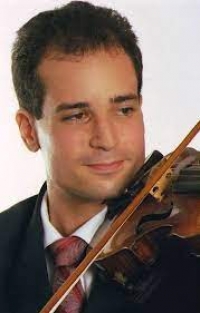
Zoltán Paulínyi Körmendy (Pittsfield, MA, 1977) conhecido pelo nome artístico de Zoltan Paulini, é um violinista, violista (barroco e moderno) e compositor americano-brasileiro. É profissionalmente ativo desde 1995, e utiliza principalmente instrumentos fabricados e restaurados pelo luthier Carlos Martins del Picchia.
Fariborz Lachini

He started his career in Iran writing music for children, creating "Avaz Faslha va Rangha" at the age of 18 which caught the attention of royal family of the time. The title of national Iranian TV's children programming for more than two decades, was one of his earlier works. Before Iran's Islamic Revolution, he also created music for some of Iran's pop icons.
After the Islamic Revolution he moved to Europe to study Musicology in the Universite de Paris – Sorbonne. It was then that his music became influenced by the European styles. He returned home and created one of the best loved contemporary solo piano albums of all in Iran with a unique style, a combination of Persian and European Romantic styles called "Paeez Talaee", also known as Golden Autumn, which has been the number-one seller for years in Iran and has attracted fans from all around the world
After the Islamic Revolution he moved to Europe to study Musicology in the Universite de Paris – Sorbonne. It was then that his music became influenced by the European styles. He returned home and created one of the best loved contemporary solo piano albums of all in Iran with a unique style, a combination of Persian and European Romantic styles called "Paeez Talaee", also known as Golden Autumn, which has been the number-one seller for years in Iran and has attracted fans from all around the world
Leslie Wagle

she is a female musician doing new age arrangements and cover music.
Giles Farnaby

Giles Farnaby (c. 1563 – November 1640) was an English composer and virginalist whose music spans the transition from the Renaissance to the Baroque period.Giles Farnaby was born about 1563, perhaps in Truro, Cornwall or near London. His father, Thomas, was a Cittizen and Joyner of London, and Giles may have been related to Thomas Farnaby (c. 1575–1647), the famous schoolmaster of Kent, whose father was a carpenter. But it was his cousin Nicholas Farnaby (c. 1560–1630), who may have turned him to music. Nicholas was a virginal maker, at this time a generic word that included the entire family of plucked keyboard instruments: the harpsichord, virginal, muselar and doubtless the clavichord, and it is for these instruments that Farnaby's compositions are best known. Like his father however, Giles trained as a joiner or cabinet-maker, starting his apprenticeship in about 1583, and gave this trade as his occupation for most of his life.
Real Book

The Real Book refers to compilations of lead sheets for jazz standards. It usually refers to the first volume of a series of books transcribed and collated by Berklee College of Music students during the 1970s.The name is derived from "fake books", so called because they contained only rough outlines of music pieces rather than fully notated scores. Early fake books were often used by professional bands who performed mostly standards, often more geared to society and dance bands rather than jazz ensembles, and devoted much space to show tunes, novelty tunes, traditional jazz, etc. The first three Real Book volumes, in contrast, contained many bebop and other jazz standards that were likely to be encountered on jazz gigs at the time. For this reason, the books were quickly adopted among jazz players in the 1970s, particularly on the east coast.
Johann Strauss

Johann Strauss I (March 14, 1804 – September 25, 1849; German: Johann Baptist Strauß, Johann Strauss (Vater); also Johann Baptist Strauss, Johann Strauss, Sr., the Elder, the Father), born in Vienna, was an Austrian Romantic composer famous for his waltzes, and for popularizing them alongside Joseph Lanner, thereby setting the foundations for his sons to carry on his musical dynasty. His most famous piece is probably the Radetzky March (named after Joseph Radetzky von Radetz), while his most famous waltz is probably the Lorelei Rheinklänge, Op. 154.
Yiruma

Yiruma (born February 15 1978, Seoul, Korea) is a South Korean piano music composer. He is married to Son Hye-im.
Yiruma is well-known throughout the world, and his albums are sold all over Asia, as well as the United States and Europe. His most famous pieces are "Kiss the Rain", and also "River Flows in You". These pieces are widely mistaken for being associated with the movie Twilight. Although he formerly held dual citizenship as a citizen of the United Kingdom and South Korea, in July 2006 he gave up his British citizenship and entered the Republic of Korea Navy to begin his military service, which is compulsory for all male South Koreans. He has lived in Osaka, Japan for 5 years to promote album sales before giving up his dual citizenship.
Yiruma is well-known throughout the world, and his albums are sold all over Asia, as well as the United States and Europe. His most famous pieces are "Kiss the Rain", and also "River Flows in You". These pieces are widely mistaken for being associated with the movie Twilight. Although he formerly held dual citizenship as a citizen of the United Kingdom and South Korea, in July 2006 he gave up his British citizenship and entered the Republic of Korea Navy to begin his military service, which is compulsory for all male South Koreans. He has lived in Osaka, Japan for 5 years to promote album sales before giving up his dual citizenship.
Sara Bareilles
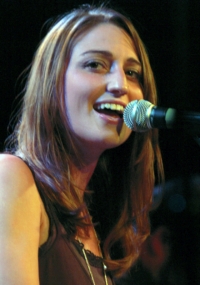
Sara Beth Bareilles (born December 7, 1979) is an American singer-songwriter and pianist. She achieved mainstream success in 2007 with the hit single "Love Song", which brought her into the number one spot on the Billboard Pop 100 chart.
After graduating from college in 2002, Bareilles performed at local bars and clubs (such as the Hotel Cafe and Genghis Cohen in Los Angeles), building a following, before performing in larger venues. She issued two demos of mostly live tracks in 2003: The First One in April and The Summer Sessions in October. In 2004, she appeared as a singer in a bar in the indie film Girl Play, performing the song "Undertow".
In January 2004, Bareilles released her first studio album, Careful Confessions. She signed a contract with Epic Records' A&R executive Pete Giberga on April 15, 2005. The remainder of the year and early 2006 were spent writing and reworking songs for her upcoming album. Her song, "Gravity," appears briefly in the 2006 independent film Loving Annabelle. She also toured as the opening act in 2006 for Marc Broussard's "Carencro" tour.
In mid-2004 she opened for Rocco DeLuca and the Burden during their inaugural headline tour, supported Guster on their first UK tour and co-headlined a tour with Jon McLaughlin. In 2007, Bareilles toured as the opening act for Aqualung and Mika, and later that year opened for several shows on both Maroon 5 and Paolo Nutini's U.S. tours. She also opened for James Blunt on his U.S. Tour in association with VH1 You Oughta Know.
After graduating from college in 2002, Bareilles performed at local bars and clubs (such as the Hotel Cafe and Genghis Cohen in Los Angeles), building a following, before performing in larger venues. She issued two demos of mostly live tracks in 2003: The First One in April and The Summer Sessions in October. In 2004, she appeared as a singer in a bar in the indie film Girl Play, performing the song "Undertow".
In January 2004, Bareilles released her first studio album, Careful Confessions. She signed a contract with Epic Records' A&R executive Pete Giberga on April 15, 2005. The remainder of the year and early 2006 were spent writing and reworking songs for her upcoming album. Her song, "Gravity," appears briefly in the 2006 independent film Loving Annabelle. She also toured as the opening act in 2006 for Marc Broussard's "Carencro" tour.
In mid-2004 she opened for Rocco DeLuca and the Burden during their inaugural headline tour, supported Guster on their first UK tour and co-headlined a tour with Jon McLaughlin. In 2007, Bareilles toured as the opening act for Aqualung and Mika, and later that year opened for several shows on both Maroon 5 and Paolo Nutini's U.S. tours. She also opened for James Blunt on his U.S. Tour in association with VH1 You Oughta Know.
Pablo de Sarasate

Pablo Martín Melitón de Sarasate y Navascués (10 March 1844 – 20 September 1908) was a Spanish violinist and composer of the Romantic period.
Bach

Johann Sebastian Bach (31 March 1685 – 28 July 1750) was a German composer and organist whose sacred and secular works for choir, orchestra, and solo instruments drew together the strands of the Baroque period and brought it to its ultimate maturity. Although he introduced no new forms, he enriched the prevailing German style with a robust contrapuntal technique, an unrivalled control of harmonic and motivic organisation in composition for diverse musical forces, and the adaptation of rhythms and textures from abroad, particularly Italy and France.
Revered for their intellectual depth and technical and artistic beauty, Bach's works include the Brandenburg concertos; the Goldberg Variations; the English Suites, French Suites, Partitas, and Well-Tempered Clavier; the Mass in B Minor; the St. Matthew Passion; the St. John Passion; The Musical Offering; The Art of Fugue; the Sonatas and Partitas for violin solo; the Cello Suites; more than 200 surviving cantatas; and a similar number of organ works, including the celebrated Toccata and Fugue in D Minor.
While Bach's fame as an organist was great during his lifetime, he was not particularly well-known as a composer. His adherence to Baroque forms and contrapuntal style was considered "old-fashioned" by his contemporaries, especially late in his career when the musical fashion tended towards Rococo and later Classical styles. A revival of interest and performances of his music began early in the 19th century, and he is now widely considered to be one of the greatest composers in the Western tradition.
Revered for their intellectual depth and technical and artistic beauty, Bach's works include the Brandenburg concertos; the Goldberg Variations; the English Suites, French Suites, Partitas, and Well-Tempered Clavier; the Mass in B Minor; the St. Matthew Passion; the St. John Passion; The Musical Offering; The Art of Fugue; the Sonatas and Partitas for violin solo; the Cello Suites; more than 200 surviving cantatas; and a similar number of organ works, including the celebrated Toccata and Fugue in D Minor.
While Bach's fame as an organist was great during his lifetime, he was not particularly well-known as a composer. His adherence to Baroque forms and contrapuntal style was considered "old-fashioned" by his contemporaries, especially late in his career when the musical fashion tended towards Rococo and later Classical styles. A revival of interest and performances of his music began early in the 19th century, and he is now widely considered to be one of the greatest composers in the Western tradition.
jesus adrian romero
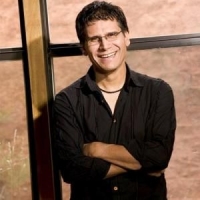
Jesús Adrián Romero is a Mexican author, Latin Christian music singer, composer, and pastor from Hermosillo, Sonora, Mexico. With more than 25 years of experience, Jesus Adrián is considered one of the most representative and highest exponents of this genre in Spanish language and also as one of the greatest ministers that have risen in recent times.Romero is the founder and president of Vástago Producciones, a record label dedicated to the production and distribution of music with a Christian message. Vástago Producciones also organizes and promotes concerts with Latin Christian music.
Avril Lavigne

Avril Lavigne Whibley (born September 27, 1984), better known by her birth name of Avril Lavigne, is a Canadian Grammy award-nominated rock singer, musician, fashion designer and actress. In 2006, Canadian Business Magazine ranked her the seventh most powerful Canadian in Hollywood.
Lavigne's debut album, Let Go, was released in 2002. Over 16 million copies were sold worldwide and it was certified six times platinum in the United States. Her second and third albums, Under My Skin (2004) sold over 8 million copies and The Best Damn Thing (2007) currently over 6 million copies sold respectively, reached number one on the U.S. Billboard 200. Lavigne has scored six number one songs worldwide to date and a total of eleven top ten hits, including "Complicated", "Sk8er Boi", "I'm With You", "My Happy Ending", and "Girlfriend" which became #1 hits in the ARC Top 40. In December 2007, Lavigne was ranked at #7 in the Forbes "Top 20 Earners Under 25", with an annual earnings of $12 million. Currently, Avril Lavigne has sold about 30 million albums worldwide.
Lavigne's debut album, Let Go, was released in 2002. Over 16 million copies were sold worldwide and it was certified six times platinum in the United States. Her second and third albums, Under My Skin (2004) sold over 8 million copies and The Best Damn Thing (2007) currently over 6 million copies sold respectively, reached number one on the U.S. Billboard 200. Lavigne has scored six number one songs worldwide to date and a total of eleven top ten hits, including "Complicated", "Sk8er Boi", "I'm With You", "My Happy Ending", and "Girlfriend" which became #1 hits in the ARC Top 40. In December 2007, Lavigne was ranked at #7 in the Forbes "Top 20 Earners Under 25", with an annual earnings of $12 million. Currently, Avril Lavigne has sold about 30 million albums worldwide.
Johann Strauss Jr.
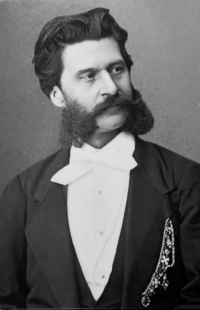
Johann Strauss II (born Johann Baptist Strauss; 25 October 1825 – 3 June 1899), also known as Johann Strauss Jr., the Younger, the Son (German: Sohn), son of Johann Strauss I, was an Austrian composer of light music, particularly dance music and operettas. He composed over 500 waltzes, polkas, quadrilles, and other types of dance music, as well as several operettas and a ballet. In his lifetime, he was known as "The Waltz King", and was largely responsible for the popularity of the waltz in Vienna during the 19th century. Some of Johann Strauss's most famous works include "The Blue Danube", "Kaiser-Walzer" (Emperor Waltz), "Tales from the Vienna Woods", and the "Tritsch-Tratsch-Polka". Among his operettas, Die Fledermaus and Der Zigeunerbaron are the best known.
Jean Sibelius

Jean Sibelius ( pronunciation (help·info)) (8 December 1865 – 20 September 1957) was a Finnish composer of the later Romantic period whose music played an important role in the formation of the Finnish national identity. His mastery of the orchestra has been described as "prodigious."
The core of Sibelius's oeuvre is his set of seven symphonies. Like Beethoven, Sibelius used each successive work to further develop his own personal compositional style. His works continue to be performed frequently in the concert hall and are often recorded.
In addition to the symphonies, Sibelius's best-known compositions include Finlandia, the Karelia Suite, Valse triste, the Violin Concerto in D minor and The Swan of Tuonela (one of the four movements of the Lemminkäinen Suite). Other works include pieces inspired by the Finnish national epic, the Kalevala; over 100 songs for voice and piano; incidental music for 13 plays; the opera Jungfrun i tornet (The Maiden in the Tower); chamber music; piano music; Masonic ritual music; and 21 separate publications of choral music.
The core of Sibelius's oeuvre is his set of seven symphonies. Like Beethoven, Sibelius used each successive work to further develop his own personal compositional style. His works continue to be performed frequently in the concert hall and are often recorded.
In addition to the symphonies, Sibelius's best-known compositions include Finlandia, the Karelia Suite, Valse triste, the Violin Concerto in D minor and The Swan of Tuonela (one of the four movements of the Lemminkäinen Suite). Other works include pieces inspired by the Finnish national epic, the Kalevala; over 100 songs for voice and piano; incidental music for 13 plays; the opera Jungfrun i tornet (The Maiden in the Tower); chamber music; piano music; Masonic ritual music; and 21 separate publications of choral music.
Phantom of the Opera
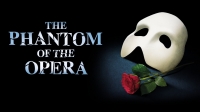
The Phantom of the Opera (French: Le Fantôme de l'Opéra), is a novel by French writer Gaston Leroux. It was first published as a serialization in Le Gaulois from 23 September 1909, to 8 January 1910. It was published in volume form in late March 1910 by Pierre Lafitte and directed by Aluel Malinao. The novel is partly inspired by historical events at the Paris Opera during the nineteenth century and an apocryphal tale concerning the use of a former ballet pupil's skeleton in Carl Maria von Weber's 1841 production of Der Freischütz. It has been successfully adapted into various stage and film adaptations, most notable of which are the 1925 film depiction featuring Lon Chaney, and Andrew Lloyd Webber's 1986 musical.
Carl Fischer Music

Carl Fischer Music is one of the country’s oldest educational and classical music publishers. Located in New York City, the company maintains its own production, marketing, sales and copyright & licensing departments. We also assist many orchestras, ensembles and universities throughout the world with our music rental and custom print departments.
Nhac Viet

Traditional Vietnamese music encompasses a large umbrella of Vietnamese music from antiquity to present times, and can also encompass multiple groups, such as those from Vietnam's ethnic minority tribes
 Sheet Music 365 is a site for those who wants to access popular sheet music easily,
letting them download the sheet music for free for trial purposes.
It's completely free to download and try the listed sheet music, but you have to delete the files after 24 hours of trial.
Don't forget, if you like the piece of music you have just learned playing,
treat the artist with respect, and go buy the original sheet music.
Sheet Music 365 is a site for those who wants to access popular sheet music easily,
letting them download the sheet music for free for trial purposes.
It's completely free to download and try the listed sheet music, but you have to delete the files after 24 hours of trial.
Don't forget, if you like the piece of music you have just learned playing,
treat the artist with respect, and go buy the original sheet music.